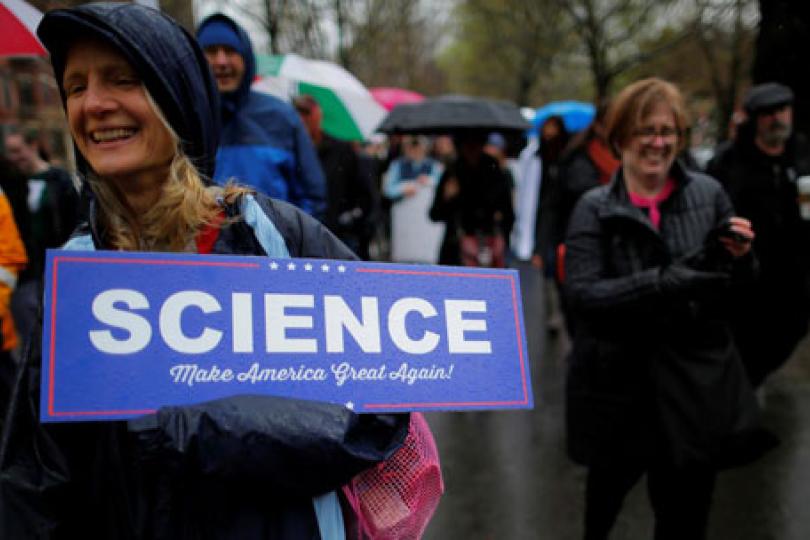When will science get its #metoo moment?
Editor's note: The following opinion piece by Fellow Sarah Myhre was first published in Newsweek.
As the #MeToo wave continues to hit various fields—politics, entertainment, technology—we’re missing one in particular: science.
Like many women, I experience the ongoing public revelations of sexual harassment and abuse through a haze of painful catharsis, an anxious discomfort similar to life after experiencing sexual violence. Rape, sexual assault, harassment and gaslighting: These things punctuate my life as a woman in the world and my 17-year academic career.
My first research experience abroad was negotiated through a mentor-mentee relationship with a senior male scientist. He waited until I was one international flight and an 8-hour bus ride away from home and a 20-minute walk into the jungle to make a pass at me. I declined his advances. I was there because I wanted to learn and advance professionally, not to be isolated and sexualized.
He then left the field after just 10 days instead of the planned two months due to a mixture of, from what I could tell, my rejection of his advances and his own whims. I and two other women were left to complete our research projects in a village fueled by cocaine trafficking.
Working alone in coral reefs, my days passed underwater. But the nights were different. I became a target of sport for young men in the village. I was stalked, assaulted many times in public, physically hurt and most graphically of all—but not actually the most traumatic of the memories—raped silently in a strange bed, in a room that smelled like urine.
Coming home, shell-shocked, having compartmentalized my experience, I analyzed my field notes. I marveled—realizing I had meaningful ecological data that connected to my work to an environmental story about disease, overfishing and coral heath. I made the impossible choice to go back the following year to those same reefs, and pay the price of my own safety, to answer a more narrow, sophisticated ecological question. I published that research in a peer-reviewed journal, and it launched my scientific career.
More than a decade later, I met again with one of the women with whom I had shared those traumatic months in the field. Over wine, we recounted our parallel experiences: opportunities brokered by powerful and predatory men; negligent and rudderless institutions; and sexual harassment and violence as the real currency of completing scientific work. After all this time, we finally held hands and cried for both of our losses. It is devastating to realize that the mentors and institutions that couldn’t—or wouldn’t—keep you safe also failed to protect your friends.
Now, as a 35-year-old single mom, I push back on these issues with anger and power of my own. There is a direct line between the sexualization and abuse of young women and the entrenched narcissism and misogyny of scientific institutions. Institutions that let men prey on young women also look past demeaning and harassing public behavior, such as a senior male scientist recently describing me as “not a real climate scientist” despite having a Ph.D., or belittling me as “someone [he had] never heard of” when discussing my professional work.
Misogyny is a system in which we are all embedded. A system that rewards some people and brutally punishes others, that degrades and diminishes the contributions of some, while celebrating the mediocrity of others. Such systems are comprehensive, with physical and sexual violence at one side of the spectrum to mockery and derision at the other.
Science isn’t just million-dollar instruments in a vacuum; actual people do this work. If you care about science, and our ability to answer questions, steward public policy and improve public safety, then you must care about the people who make up the scientific community. Women, pregnant women, people of color, immigrants and refugees, disabled or LGBTQ, scientists are a diverse, intersectional galaxy of identities, histories and expertise. To advocate for science requires us to address and dismantle institutional misogyny and racism. Anything less is morally disingenuous.
Science should be a feminist institution, but we aren’t there yet. We have been silenced by a culture that tells us to divest ourselves from ourselves, for the sake of apolitical objectivity. Everywhere in our society, but doubly so in science, we are told to remain calm, play nice and keep our head down. As if our silence and complicity, indeed our docility, will be rewarded.
This is a lie. There is no reward in acquiescence, only subjugation. We deserve better, and we’ll get it.
The feminist reckoning is here, and it is coming for science.

